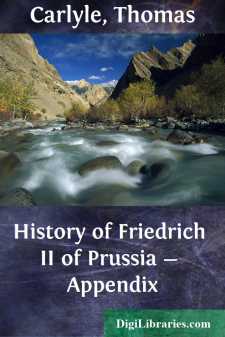History
- Africa 30
- Americas (North Central South West Indies) 50
- Ancient 68
- Asia 58
- Australia & New Zealand 8
- Canada 41
- Caribbean & West Indies 1
- Civilization 20
- Eastern Europe 12
- Europe 310
- Expeditions & Discoveries 60
- General 77
- Historical Geography 1
- Jewish 9
- Latin America 3
- Medieval 8
- Middle East 14
- Military 248
- Revolutionary 8
- Study & Teaching 5
- United States 353
- Western Europe 56
- World 13
History Books
Sort by:
CHAPTER I The remotest fact in the history of England is written in her rocks. Geology tells us of a time when no sea flowed between Dover and Calais, while an unbroken continent extended from the Mediterranean to the Orkneys. Huge mounds of rough stones called Cromlechs, have yielded up still another secret. Before the coming of the Keltic-Aryans, there dwelt there two successive races, whose story is...
more...
by:
Thomas Carlyle
A DAY WITH FRIEDRICH.—(23d July, 1779.) "OBERAMTMANN (Head-Manager) Fromme" was a sister's son of Poet, Gleim,—Gleim Canon of Halberstadt, who wrote Prussian "grenadier-songs" in, or in reference to, the Seven-Years War, songs still printed, but worth little; who begged once, after Friedrich's death, an OLD HAT of his, and took it with him to Halberstadt (where I hope it...
more...
Preface For some reason the people of today are not nearly as familiar with the achievements of the last fifty years as they are with those of earlier days. The school boy can glibly recount the story of Columbus, William Penn, or Washington, but asked about the events leading up to the settlement of the West will know nothing of them and will probably reply "they don't teach us that in our...
more...
by:
Arthur Gilman
ONCE UPON A TIME. Once upon a time, there lived in a city of Asia Minor, not far from Mount Ida, as old Homer tells us in his grand and beautiful poem, a king who had fifty sons and many daughters. How large his family was, indeed, we cannot say, for the storytellers of the olden time were not very careful to set down the actual and exact truth, their chief object being to give the people something to...
more...
CHAPTER IHOMES OF THE COLONISTS When the first settlers landed on American shores, the difficulties in finding or making shelter must have seemed ironical as well as almost unbearable. The colonists found a land magnificent with forest trees of every size and variety, but they had no sawmills, and few saws to cut boards; there was plenty of clay and ample limestone on every side, yet they could have no...
more...
CHAPTER I MOBILIZATION AND MOVE TO FRANCE The Division mobilized with its Headquarters at Cork--two brigades in Ireland, namely, the 16th Infantry Brigade at Fermoy, and the 17th Infantry Brigade at Cork, and one Infantry Brigade--the 18th--at Lichfield. Divisional troops mobilized in Ireland. The order for mobilization was received at 10 p.m. on the 4th August 1914. On the 15th August units mobilized...
more...
by:
Cassius Dio
BOOK 78, BOISSEVAIN.) [Sidenote: A.D. 211 (a.u. 964)] [Sidenote:—1—] After this Antoninus secured the entire power. Nominally he ruled with his brother, but in reality alone and at once. With the enemy he came to terms, withdrew from their country, and abandoned the forts. But his own people he either dismissed (as Papinianus the prefect) or else killed (as Euodus, his nurse, Castor, and his wife...
more...
CHAPTER I LIVING BELIEFS 'The observance of the law alone entitles to the right of belonging to my religion.'—Saying of the Buddha. For the first few years of my stay in Burma my life was so full of excitement that I had little care or time for any thought but of to-day. There was, first of all, my few months in Upper Burma in the King's time before the war, months which were full of...
more...
INTRODUCTORY. "If humour only meant laughter," said Thackeray, in his essay on the English humorists, "you would scarcely feel more interest about humorous writers than the life of poor Harlequin, who possesses with these the power of making you laugh. But the men regarding whose lives and stories you have curiosity and sympathy appeal to a great number of our other faculties, besides our...
more...
CHAPTER I THE EARLY AGES The Chinese are unquestionably the oldest nation in the world, and their history goes back to a period to which no prudent historian will attempt to give a precise date. They speak the language and observe the same social and political customs that they did several thousand years before the Christian era, and they are the only living representatives to-day of a people and...
more...











